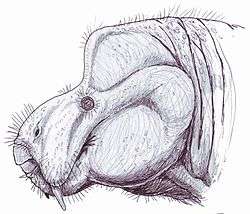Ischigualastia
Ischigualastia is an extinct genus of dicynodonts (a group of synapsids), that lived during the Carnian age of the Late Triassic Period. The genus was found in and named after the Ischigualasto Formation (Cancha de Bochas Member) of the Ischigualasto-Villa Unión Basin in northwestern Argentina. It has been placed in the family Stahleckeriidae.[1]
| Ischigualastia | |
|---|---|
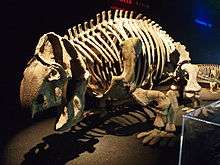 | |
| Mounted skeleton of Ischigualastia jenseni | |
| Scientific classification | |
| Kingdom: | Animalia |
| Phylum: | Chordata |
| Clade: | Therapsida |
| Clade: | †Dicynodontia |
| Family: | †Stahleckeriidae |
| Subfamily: | †Stahleckeriinae |
| Genus: | †Ischigualastia Cox 1962 |
| Species | |
| |
Description
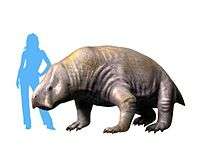
The genus is described as an enormous dicynodont, with a short, high skull, and lacking tusks.[2] It is regarded as larger than its later, more famous relative Placerias, which was up to 3.5 meters (11 feet) long and weighed 1 to 2 tonnes (0.98 to 1.97 long tons; 1.1 to 2.2 short tons).
Paleoecology
It was a large quadrupedal herbivore, most common at the base of the Ischigualasto Formation. It was a common member of the local fauna, although not as abundant as the medium-sized herbivores Hyperodapedon and Exaeretodon. The only danger to such a huge animal was the almost equally large carnivorous pseudosuchian Saurosuchus and perhaps the predatory dinosaur Herrerasaurus, which shared the same environment. It is likely that pressure from this predator pushed Ischigualastia into extinction, for it becomes less common and finally disappears in the higher levels of the Ischigualasto Formation. A somewhat smaller relative or descendant, Placerias, survived in Laurasia.[2]
Gallery
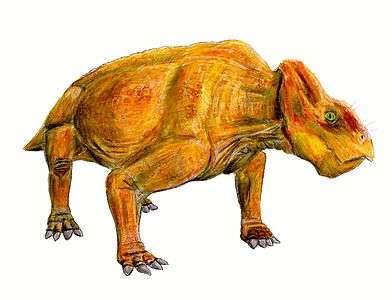 Life restoration of I. jenseni
Life restoration of I. jenseni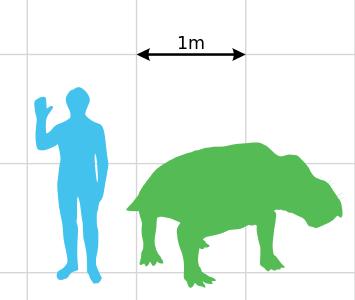 Size of I. jenseni relative to a human
Size of I. jenseni relative to a human
See also

- Stahleckeriidae
- List of therapsids
References
- Carroll, Robert L. (1988). Vertebrate Paleontology and Evolution. W.H. Freeman and Company. ISBN 0-7167-1822-7.
- Kazlev, M.A., White, A.T. (2004-02-01). "Therapsida: Neotherapsida: Dicynodontia". Palaeos. Retrieved 1 November 2014.
